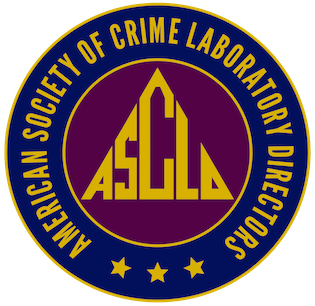The American Society of Crime Lab Directors represents managers, directors, and leaders of crime laboratories across the United States spanning the entire range of local, state, and federal government laboratories as well as private labs. As such, policymakers often look to ASCLD to weigh in on matters affecting the nation’s crime labs. ASCLD produces Position Papers, Formal Comments, and Official Statements on a wide range of topics. Below, you can find ASCLD’s official positions and comments on multiple issues across last last several years.
Position Statements
Position Statements
- ASCLD Position Statement on Parent Agencies– November 2022
Position Statements
Position Statements
- Rapid DNA Position Statement with Overview– November 2020
- ASCLD White Paper on Sexual Assault Evidence Kits – May 2020
Other ASCLD Policy Documents
- 2020-2021 ASCLD National Outreach Priorities and Agenda – December 2020
Position Statements
- ASCLD Comments to NIJ’s Needs Assessment 2019 Report – December 2019
- Volume of Untested Sexual Assault Evidence Kits (SAEKs) – November 2019
- ASCLD Investigative Genetic Genealogy Position Paper – October 2019
- Industrial Hemp and its Impact to Forensic Laboratories – January 2019
- National Helium Gas Shortage – February 2019
- Trauma and Stress in the Field of Forensic Science – February 2019
ASCLD Comments on U.S. Department of Justice Documents
2019 NEEDS ASSESSMENT REPORT FOR FORENSIC LABORATORIES AND MEDICAL EXAMINERS
UNIFORM LANGUAGE FOR TESTIMONY AND REPORTS
- Footwear and Tire ULTR
- General Chemistry ULTR
- Glass ULTR
- Hair ULTR
- Handwriting ULTR
- Latent Prints ULTR
- Serology ULTR
- Textile Fibers ULTR
- Toxicology ULTR
- Y and Mito DNA ULTR
FORENSIC SCIENCE DISCIPLINE REVIEWS
Other ASCLD Policy Documents
- 2019-2020 ASCLD National Outreach Priorities and Agenda – December 2019
Position Statements
- ASCLD Comments to NIST Foundational Documents – November 2018
- Forensic Science Commissions and Massachusetts Senate Bill 2173 – March 2018
Other ASCLD Policy Documents
- 2018-2019 ASCLD National Outreach Priorities and Agenda – September 2018
ASCLD Statement of Principles on Ethics – June 2018
Position Statements
- Position Statement on Rapid DNA – November 2017
- DAG Announcement on DOJ Forensic Inititative – August 2017
- NIJ SAFER Report – August 2017
ASCLD Comments on U.S. Department of Justice Documents
2017 RFI ON ADVANCING FORENSIC SCIENCE
Other ASCLD Policy Documents
- ASCLD Opioid Press Release – November 2017
- ASCLD Comments on NIST RFI for OSAC 2.0 – October 2017
- 2017-18 ASCLD National Outreach Priorities and Agenda – July 2017
ASCLD Comments on National Commission on Forensic Science Documents
- Views on Accreditation of Certifying Bodies – June 2016
- Views on Certification of FSSPs – June 2016
- Views on Optimizing Human Performance – June 2016
- Views on Proficiency Testing – June 2016
- Views Regarding Accreditation Program Requirements – June 2016
- Recommendation and Views on Case Record and Report Content – June 2016
- Recommendation on DME Accreditation– September 2016
- Views on Statistical Statements in Forensic Testimony – September 2016
- Views on Use of Checklists in Forensic Science– September 2016
ASCLD Comments on National Commission on Forensic Science Documents
- Recommendation on AFIS Interoperability – May 2015
- Recommendation on Discovery – May 2015
- Recommendation on Root Cause Analysis – May 2015
- Recommendation on Testimony Using the Term “Reasonable Scientific Certainty” – May 2015
- Recommendation on National Code of Professional Responsibility – May 2015
- Recommendation on National Forensic Science Curriculum – August 2015
- Views on Proficiency Testing in Forensic Science – August 2015
- Views on Report Content – August 2015
- Views on Task Relevant Information – August 2015
- Views on Critical Steps to Accreditation – December 2015
- Views on Establishing the Foundational Literature within the Forensic Science Disciplines – December 2015
- Recommendation on Funding Post-doctoral Projects to Facilitate Translation of Research into Forensic Science Practice – December 2015
- Recommendation on National Code of Professional Responsibility – December 2015
- Recommendation on Testimony Using the Term “Reasonable Scientific Certainty” – December 2015
- Recommendation on Transparency of Quality System Documents– December 2015
Position Statements
- Accreditation – August 2014
- Rapid DNA – March 2014
- CODIS Access – March 2014
ASCLD Comments on National Commission on Forensic Science Documents
- Recommendation on Presentation of Expert Testimony – October 2014
- Recommendation on Presentation of Expert Testimony – November 2014
Other ASCLD Policy Documents
Other ASCLD Policy Documents
- ASCLD Comments on NIST Guidance Groups – November 2013
SAFER Act Overview – March 2013
ASCLD Comments on the National Commission on Forensic Science – March 2013
Other ASCLD Policy Documents
- President Sprigg’s Comments on Rapid DNA Instrumentation – October 2012
Position Statements
- Reviewing Historical Practices of Forensic Science Laboratories – September 2010
- Technical Reviews of Outsourced DNA Cases – June 2010
- DNA Backlogs and Laboratory Capacity – February 2010
Other ASCLD Policy Documents
- ASCLD Letter to Congress Regarding the NAS Report – March 2009
ASCLD Comments on the NAS Report – February 2009
NAS Report Executive Summary – February 2009
ASCLD Position #1 - Ethics and Objectivity
ASCLD believes the practice of forensic science must be built on a foundation of ethics and objectivity. Regardless of whether a laboratory is a part of a police or sheriff’s department, a local or state attorney’s office, a medical examiner’s office or any other parent agency, laboratory managers and employees of forensic laboratories must avoid any activity, interest, influence, or association that interferes or appears to interfere with their independent ability to exercise professional judgment. Our professional ethics provide the basis for the examination of evidence and the reporting of analytical results by blending the scientific principles and the statutory requirements into guidelines for professional behavior. Laboratory managers must strive to ensure that forensic science examinations are conducted in accordance with sound scientific principles and within the framework of the statutory requirements to which forensic professionals are responsible.
ASCLD Position #2 – Financial Resources
ASCLD believes proper and continuous funding is critical for all forensic science laboratories and operations to meet their near-term and long-term operational demands as well as their training and continuing education needs. Adequately resourced budgets allow forensic managers to provide the proper space, technological support and staffing levels to meet (i) the quality and time demands of casework and (ii) the on-going competency requirements for training, research, technological development, and innovation. Funding must be substantial and consistent in order to provide accurate, timely and meaningful results that can identify the guilty and exonerate the innocent.
ASCLD Position #3 – Accreditation
ASCLD believes accreditation of ALL forensic science operations is an essential quality component. Accreditation, with movement toward ISO/IEC 17025 based international standards as currently offered by our strategic partners, provides confidence and assurance to a parent organization, its employees, the criminal justice community, and the public that the operation can meet the most comprehensive forensic quality management system requirements.
ASCLD Position #4 – Education, Training and Certification
ASCLD believes laboratory managers and parent organizations need to develop, share and support the best practices of technological and fiscal efficiency in order to achieve standardization within the forensic disciplines. The development of standardized methods and procedures, the development of common language in benchmarking performance studies, and the careful analysis of fiscal and operational metrics will provide improved accountability to the justice community and standardization between all forensic science laboratories and operations.
ASCLD Position #5 – Standardization and Best Practices
ASCLD believes laboratory managers and parent organizations need to develop, share and support the best practices of technological and fiscal efficiency in order to achieve standardization within the forensic disciplines. The development of standardized methods and procedures, the development of common language in benchmarking performance studies, and the careful analysis of fiscal and operational metrics will provide improved accountability to the justice community and standardization between all forensic science laboratories and operations.
ASCLD Position #6 – Oversight
ASCLD believes the creation and support of an advisory infrastructure which includes the appropriate stakeholders is a means to promote and encourage scientific and managerial excellence in the forensic community. Such an infrastructure, however named and formed, must be advisory (non-controlling) in function and comprised of individuals with the knowledge and understanding of forensic science which could identify and help resolve legitimate concerns while discrediting criticisms that are unfounded or unsupported.

